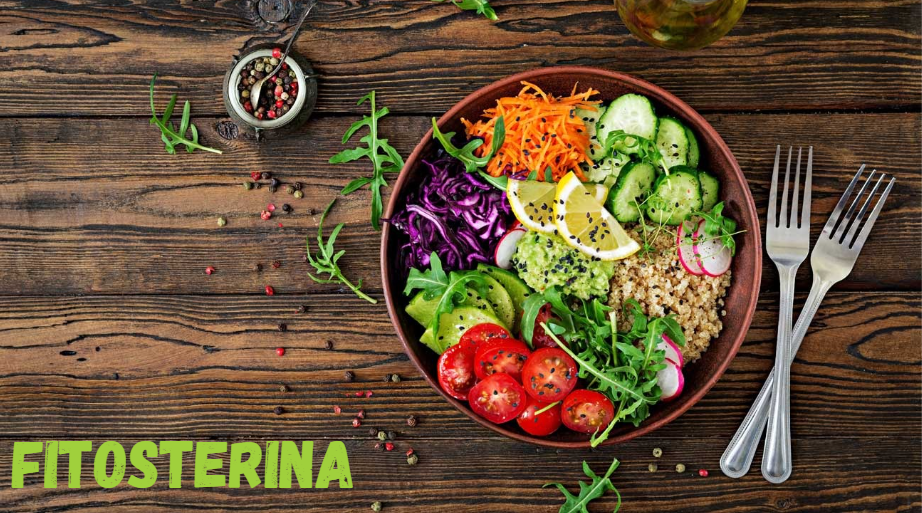Fitosterina: The Natural Plant Compound for Cholesterol Management and Overall Health
Fitosterina, also known as plant sterols, is a fascinating molecule found in various plants. As a natural plant compound, fitosterina has garnered attention for its potential to lower cholesterol, boost immunity, and promote overall health. In this comprehensive article, we will delve into the myriad benefits of fitosterina, its uses, and why it should be a staple in your diet.
Contents [hide]
What is Fitosterina?
Fitosterina, or plant sterols, are a group of naturally occurring compounds found in plant cell membranes. Structurally similar to cholesterol, fitosterina can block the absorption of cholesterol in the human intestine, making it a valuable tool for managing cholesterol levels.
The Science Behind Fitosterina
The structure of fitosterina is similar to that of cholesterol, which allows it to compete with cholesterol for absorption in the digestive system. By reducing the amount of cholesterol absorbed, fitosterina helps lower the overall cholesterol levels in the body. This process can significantly decrease the risk of heart disease and other cholesterol-related conditions.
Sources of Fitosterina
Fitosterina is found in a variety of plant-based foods, including:
- Vegetable oils: Sunflower, canola, and corn oils are particularly high in plant sterols.
- Nuts and seeds: Almonds, walnuts, and flaxseeds are excellent sources of fitosterina.
- Legumes: Beans, lentils, and peas contain notable amounts of plant sterols.
- Whole grains: Oats, barley, and whole wheat products are rich in fitosterina.
Fitosterina Supplements
In addition to dietary sources, fitosterina is available in supplement form. These supplements are often used by individuals seeking to lower their cholesterol levels more effectively than through diet alone.
Health Benefits of Fitosterina
Fitosterina offers a wide range of health benefits, making it a valuable addition to a balanced diet. Let’s explore some of the key benefits:
Cholesterol Reduction
One of the most well-documented benefits of fitosterina is its ability to lower cholesterol levels. Studies have shown that consuming 2 grams of plant sterols per day can reduce LDL (bad) cholesterol by up to 10%. This reduction is significant, as high LDL cholesterol is a major risk factor for heart disease.
Immune System Boost
Fitosterina has been shown to enhance immune function. Plant sterols can modulate the immune response, improving the body’s ability to fight off infections and diseases. This immune-boosting property makes fitosterina particularly beneficial during cold and flu season.
Anti-Inflammatory Properties
Inflammation is a natural response to injury or infection, but chronic inflammation can lead to various health issues, including heart disease, diabetes, and certain cancers. Fitosterina has anti-inflammatory properties that can help reduce chronic inflammation, promoting overall health.
Cancer Prevention
Emerging research suggests that fitosterina may play a role in cancer prevention. Some studies have indicated that plant sterols can inhibit the growth of certain cancer cells, particularly in the breast, prostate, and colon. While more research is needed, these findings are promising.
Weight Management
Fitosterina may also aid in weight management. By reducing cholesterol absorption and improving metabolic health, plant sterols can help maintain a healthy weight. Additionally, the anti-inflammatory properties of fitosterina can support weight loss efforts by reducing inflammation-related weight gain.
Heart Health
Beyond cholesterol reduction, fitosterina supports overall heart health. By improving lipid profiles and reducing inflammation, plant sterols can lower the risk of heart disease and other cardiovascular conditions.
Skin Health
Fitosterina can also benefit skin health. The anti-inflammatory properties of plant sterols can help manage skin conditions such as eczema and psoriasis. Additionally, fitosterina promotes skin hydration and elasticity, contributing to a more youthful appearance.
How to Incorporate Fitosterina into Your Diet
Incorporating fitosterina into your diet is relatively easy, given its presence in many common foods. Here are some practical tips to boost your intake of plant sterols:
Opt for Plant-Based Oils
Use vegetable oils such as sunflower, canola, or corn oil in your cooking. These oils are high in fitosterina and can easily replace other types of cooking oils.
Snack on Nuts and Seeds
Keep a variety of nuts and seeds on hand for snacking. Almonds, walnuts, and flaxseeds are excellent sources of plant sterols and make for a healthy, cholesterol-lowering snack.
Eat More Legumes
Incorporate beans, lentils, and peas into your meals. These legumes are not only high in fitosterina but also rich in fiber and protein, making them a nutritious addition to any diet.
Choose Whole Grains
Opt for whole grain versions of bread, pasta, and cereals. Whole grains such as oats and barley are high in plant sterols and provide numerous other health benefits.
Consider Supplements
If you have high cholesterol or are at risk for heart disease, consider taking a fitosterina supplement. Consult with your healthcare provider to determine the appropriate dosage for your needs.
Fitosterina in Functional Foods
Functional foods are foods that have been fortified with additional nutrients to provide health benefits beyond basic nutrition. Fitosterina is often added to functional foods to enhance their cholesterol-lowering properties. Some common examples include:
Fortified Margarine
Many margarines are fortified with plant sterols to help lower cholesterol levels. These margarines can be used in place of regular margarine or butter.
Fortified Yogurt
Some yogurt products are enhanced with fitosterina to boost their health benefits. These yogurts can be enjoyed as part of a balanced breakfast or snack.
Fortified Milk and Juices
Certain milk and juice products are fortified with plant sterols. These beverages provide an easy and convenient way to increase your intake of fitosterina.
Potential Side Effects and Considerations
While fitosterina is generally considered safe for most people, there are some potential side effects and considerations to keep in mind.
Gastrointestinal Issues
Some individuals may experience mild gastrointestinal issues such as bloating, gas, or diarrhea when consuming high amounts of plant sterols. These symptoms are usually temporary and can be minimized by gradually increasing your intake.
Phytosterolemia
Phytosterolemia, also known as sitosterolemia, is a rare genetic condition that causes an accumulation of plant sterols in the blood. Individuals with this condition should avoid fitosterina supplements and consult with their healthcare provider for dietary recommendations.
Interaction with Medications
Fitosterina may interact with certain medications, particularly those used to lower cholesterol. If you are taking cholesterol-lowering medications, consult with your healthcare provider before starting a fitosterina supplement.
Recommended Dosage
The recommended dosage of fitosterina for cholesterol reduction is typically 2 grams per day. This dosage has been shown to effectively lower LDL cholesterol without causing significant side effects.
FAQs about Fitosterina
What is fitosterina?
Fitosterina, also known as plant sterols, are naturally occurring compounds found in plant cell membranes. They are known for their ability to lower cholesterol levels and provide various health benefits.
How does fitosterina lower cholesterol?
Fitosterina lowers cholesterol by competing with cholesterol for absorption in the digestive system. This reduces the amount of cholesterol absorbed, leading to lower overall cholesterol levels in the body.
What foods are high in fitosterina?
Foods high in fitosterina include vegetable oils (such as sunflower, canola, and corn oils), nuts (such as almonds and walnuts), seeds (such as flaxseeds), legumes (such as beans and lentils), and whole grains (such as oats and barley).
Are there any side effects of fitosterina?
While fitosterina is generally safe for most people, some individuals may experience mild gastrointestinal issues such as bloating, gas, or diarrhea. These symptoms are usually temporary and can be minimized by gradually increasing intake.
Can fitosterina be taken as a supplement?
Yes, fitosterina is available in supplement form. These supplements are often used by individuals seeking to lower their cholesterol levels more effectively than through diet alone. It is recommended to consult with a healthcare provider before starting a fitosterina supplement.
Is fitosterina safe for everyone?
Fitosterina is generally safe for most people. However, individuals with phytosterolemia, a rare genetic condition, should avoid fitosterina supplements and consult with their healthcare provider for dietary recommendations. Additionally, those taking cholesterol-lowering medications should consult with their healthcare provider before starting a fitosterina supplement.
Conclusion
Fitosterina, or plant sterols, is a powerful natural compound with numerous health benefits. From lowering cholesterol and boosting immunity to reducing inflammation and supporting weight management, fitosterina is a valuable addition to a balanced diet.
By incorporating fitosterina-rich foods into your daily meals and considering supplements if necessary, you can harness the health-promoting properties of this remarkable plant compound.
Remember to consult with your healthcare provider before making any significant changes to your diet or starting new supplements, especially if you have existing health conditions or are taking medications. Embrace the power of fitosterina and take a proactive step towards better health today.






















































Post Comment